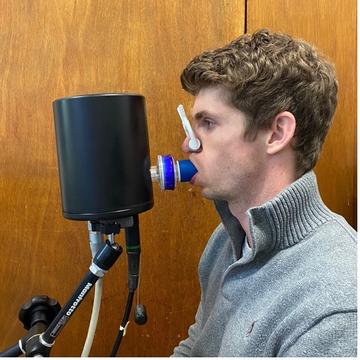As a respiratory disease, COVID-19 infection mainly affects the lungs. While most people recover completely, a significant number of individuals experience symptoms that can persist for weeks or months post COVID infection, sometimes referred to as ‘long-COVID’. It remains unclear whether these symptoms are associated with any long-term damage that reduces the function of the lungs and respiratory system.
To investigate this, a study including researchers from the Ritchie group in the Department of Chemistry used a novel computational approach to assess how COVID-19 may affect long-term lung function. The results have recently been published in the Journal of Applied Physiology.

The molecular flow sensor demonstrated by Dr Nick Smith, one of the chemists who developed it. The device in the black box is breathed into by the subject using a mouthpiece and noseclip to ensure that all inhaled and exhaled gases enter the device.
The research team assessed lung function using a novel technique called computed cardiopulmonography. In this method, participants breathe through a mouthpiece connected to the measuring device, known as a molecular flow sensor (MFS) and developed in the Department of Chemistry over the last decade, that uses lasers to take highly precise measurements of gas composition.
Gas concentrations are combined with flow measurements to generate highly precise profiles of gas being taken in or produced by the lungs. Using a custom mechanistic model of the lung it is possible to calculate clinically valuable parameters such as the variation in the ventilation and blood supply of gas exchange compartments within the lung.
This technique has already been shown capable of predicting whether patients with asthma required an increase in their medication. It also shows promise as a method to detect sub-clinical lung disease, opening the possibility of eventually treating patients earlier to prevent the onset of more significant disease.
Key findings from this study:
- Prior COVID-19 infection was associated with more uneven inflation of the lungs during normal breathing. This is something that is part of normal aging in the lung. The changes seen after COVID-19 in this study are roughly equivalent to those associated with 15 years of normal aging, but are still much smaller than those seen in established lung disease.
- There was an association between hospitalisation with COVID-19 and smaller lung volumes, but it is not known whether the smaller volumes are caused by COVID-19 infection, or instead represent a predisposing factor for more severe infection.
- Admission to the ICU was associated with an enlarged respiratory dead space (the volume of gas that is breathed into the lungs but does not participate in gas exchange). This may have been caused by COVID-19 infection, but equally may have been caused by the process of mechanical ventilation.
Professor Grant Ritchie, from the Department of Chemistry, said:
We are delighted to see the translation of the basic science research developed in the Departments of Chemistry and Physiology, Anatomy & Genetics, into a successful clinical study of how COVID-19 may affect long-term lung function. The technology has allowed subtle changes in lung function to be determined and we hope that similar measurements will be of use in other patient groups.
Lead author Professor Peter Robbins, from the Department of Physiology, Anatomy and Genetics, said
Our study illustrates the capability of this new technique to study aspects of lung function not so easily measured through standard clinical tests. However, without measurements prior to infection, it is not possible to conclude whether these differences result directly from COVID-19 infection, or whether they are actual risk factors associated with the lungs that predispose towards more serious disease.
Respiratory Consultant Dr Nayia Petousi, from the Nuffield Department of Medicine, and one of the clinical leads for the study, said:
We hope that by providing insight into the understanding of post-COVID effects on the lungs the results can be of help in the clinical management of patients.